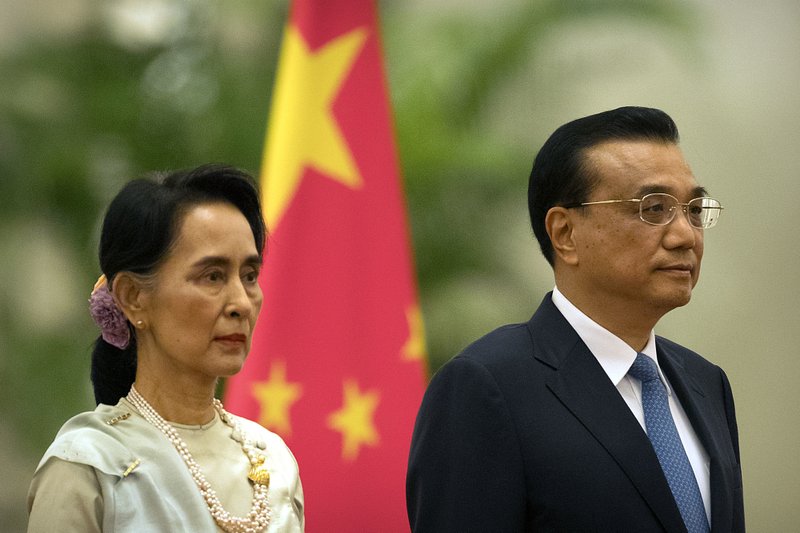BEIJING -- Efforts by Burmese leader Aung San Suu Kyi this week to bolster ties with her country's northern neighbor China hinge on whether she can resolve the impasse over an immense, Chinese-funded dam that faces overwhelming regional opposition.
Suu Kyi was welcomed by Premier Li Keqiang at a formal ceremony Thursday at part of a visit that will include talks with Chinese President Xi Jinping. The trip ending Sunday is her first to China since her party won a historic majority last year.
Now leading Burma with the title of state counselor, Suu Kyi is a Nobel Peace Prize winner who spent more than 15 years in detention, mostly in house arrest, under Burma's former military junta, which was supported for years by the authoritarian Communist Party-led government in Beijing. But analysts say Suu Kyi has shown pragmatism and a desire to strengthen Burma's relationship with China, its top trading partner and a major investor, while also reaching out to the United States, Europe and Japan.
In opening remarks in her meeting with Li, Suu Kyi said she hoped her visit would promote "feelings of friendship" between the countries.
Key to both sides is the $3.6 billion Myitsone dam project in northern Burma, funded by Chinese power interests but suspended in 2011 by Burma's former military-backed president, Thein Sein. A spokesman for Burma's foreign-affairs department said China was expected to raise the dam dispute this week.
China sees the dam as an important part of a national strategy to reduce its reliance on fossil fuels and meet its targets to cut pollution. It has pursued a charm offensive in Burma partly to push for construction to resume.
But opponents in Burma say the reservoir created by the Myitsone dam would create huge floods on the Irrawaddy River, endangering ecologically sensitive areas and displacing thousands of people. They also question the previous arrangement in which China would take 90 percent of the dam's power, while nearly 70 percent of Burma has no access to electricity, according to the World Bank.
The dam is one of several Chinese-backed projects stalled by protests from Burmese citizens newly emboldened to speak out after democratic changes, part of a larger backlash against China's economic domination of its poor southern neighbor.
Suu Kyi's government recently announced a commission to review all hydroelectric projects along the Irrawaddy. Zhao Gancheng, director of the Asia-Pacific Center at the Shanghai Institutes for International Studies, said that announcement might be a signal that a compromise was possible.
"To handle it well will help create a favorable condition for future trade and economic development between the two countries," Zhao said. "Otherwise, obstacles will emerge in attracting investment from China in the future and that is not what the new Burmese government and Aung San Suu Kyi want to see."
Aaron Connelly, a research fellow for East Asia at the Lowy Institute for International Policy in Sydney, said Suu Kyi could offer an alternative plan that mollifies China and at least some of the opposition in Burma.
"That would be the question on the Myanmar side," Connelly said. "Is there something that can be offered that meets the expectations, but does not create a lake the size of Singapore on the Irrawaddy?"
Burma is often called Myanmar, a name adopted after the military took power in 1989. Regime opponents refused to adopt the name change, as have the U.S. and the United Kingdom.
Suu Kyi remains an icon to many people in Burma, and that may give her the standing to seek a deal that allows the dam to go forward under different circumstances, Connelly said.
She is also likely to seek more cooperation from China as her government begins a peace conference at the end of August with ethnic minorities from the region where the dam is planned, and may tie the two issues together, Connelly said. China has been involved previously in negotiations between the government and Kachin rebels, who have fought for decades in regions near the Chinese border.
"She constantly surprises in what she's willing to do in terms of political agreements that she's willing to strike, and because she's such a singularly popular figure," he said. "She can potentially make a deal here that would be very unpopular and bounce back from that."
Beijing supports the peace process because "a politically stable and economically prosperous Myanmar is in China's best interests," China's official Xinhua News Agency said in an editorial Wednesday.
"Given the fact that a strong China-Myanmar partnership is important for both sides, it is welcome that Suu Kyi, a key figure in the Myanmar government and the leader of the ruling party, plays a greater role in helping secure a healthy Myanmar-China relationship," Xinhua said.
China considers Burma strategically important as a gateway to the Indian Ocean and Bay of Bengal, and it wants to secure oil and gas pipelines running across the country to the Chinese border.
Along with stalled projects, another friction-causing issue is fighting between Burma's military and ethnic minority rebels along the border that has killed Chinese farmers and sent a flow of refugees into China.
Information for this article was contributed by Esther Htusan and Yu Bing of The Associated Press.
A Section on 08/19/2016
